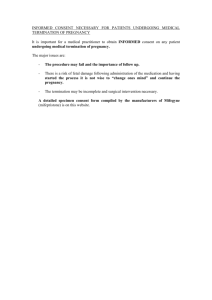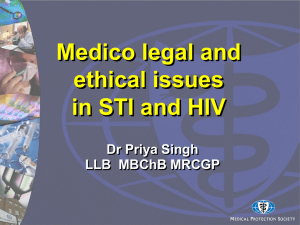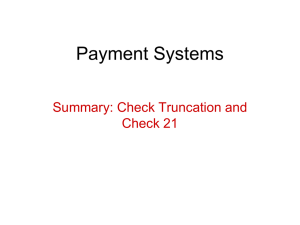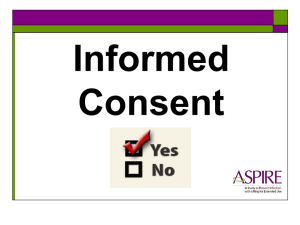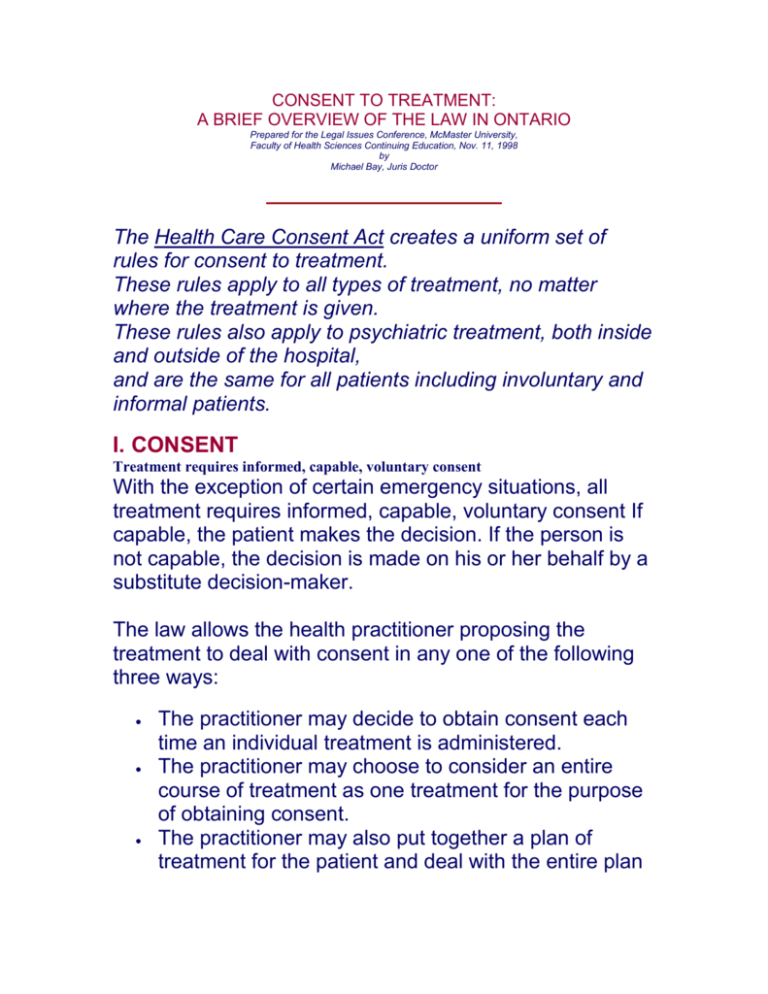
CONSENT TO TREATMENT:
A BRIEF OVERVIEW OF THE LAW IN ONTARIO
Prepared for the Legal Issues Conference, McMaster University,
Faculty of Health Sciences Continuing Education, Nov. 11, 1998
by
Michael Bay, Juris Doctor
The Health Care Consent Act creates a uniform set of
rules for consent to treatment.
These rules apply to all types of treatment, no matter
where the treatment is given.
These rules also apply to psychiatric treatment, both inside
and outside of the hospital,
and are the same for all patients including involuntary and
informal patients.
I. CONSENT
Treatment requires informed, capable, voluntary consent
With the exception of certain emergency situations, all
treatment requires informed, capable, voluntary consent If
capable, the patient makes the decision. If the person is
not capable, the decision is made on his or her behalf by a
substitute decision-maker.
The law allows the health practitioner proposing the
treatment to deal with consent in any one of the following
three ways:
The practitioner may decide to obtain consent each
time an individual treatment is administered.
The practitioner may choose to consider an entire
course of treatment as one treatment for the purpose
of obtaining consent.
The practitioner may also put together a plan of
treatment for the patient and deal with the entire plan
of treatment as one treatment for the purpose of
obtaining consent.
A plan of treatment is a plan developed by one or more
health practitioners that deals with one or more of the
patient's current health problems, or health problems that
the patient is likely to have in the future given his or her
current condition. The plan must provide for various
treatments and may also allow for the withholding or
withdrawal of treatment in light of the person's current
health condition.
The meaning of consent
Valid consent does not mean a signature on a piece of
paper. For consent to be valid, it must be informed and be
given voluntarily by a capable person. Consent may be
oral or written; expressed or implied.
Informed consent means that the health practitioner has
given information that a reasonable person would need to
make the decision and has answered any relevant
questions that the person asks. The consent must not be
obtained through misrepresentation or fraud.
Consent may be withdrawn at any time by a person who is
capable of doing so. A person who is capable of
consenting to a treatment is considered to be capable to
withdraw the consent. A person who becomes capable
after a treatment starts is entitled to take over the decisionmaking from the substitute decision- maker.
Unless it is unreasonable in the circumstances, a health
practitioner may presume that a consent to a treatment
includes:
Consent to variations or adjustments in the treatment
if the nature, expected benefits, material risks and
material side effects of the changed treatment are not
significantly different from the original treatment
Consent to the continuation of the same treatment in
a different setting if there is no significant change in
the expected benefits, material risks or material side
effects as a result of the change in setting
II. EMERGENCY TREATMENT
There is an emergency when a person is apparently
experiencing severe suffering or is at risk of sustaining
serious bodily harm if treatment is not administered
immediately.
A health practitioner may treat without consent in the
following emergency situations unless the practitioner has
reasonable cause to believe that the person, while capable
and at least sixteen years old, expressed a wish to refuse
consent to the treatment:
If the person appears to be capable but cannot
communicate with the health practitioner because of a
language difference or a disability. Reasonable steps
must be taken to attempt communication before
treatment begins. The treatment may only continue
for as long as necessary to enable communication.
Treatment may only be given if there is no reason to
believe that the person does not., want the treatment.
If the patient is incapable, a substitute is not available
and any a delay in fmding the person's substitute
decision-maker would prolong the person's suffering
or put the person at risk of serious bodily harm.
Treatment may only continue as long as necessary to
receive a decision from the substitute decision-maker.
If the substitute decision-maker refuses to consent to
the person's treatment and the practitioner is of the
opinion that the substitute decision-maker has not
followed the decision making rules found in the Health
Care Consent Act. (These rules are " discussed in
Section V below.) ,
III. CAPABLE OF CONSENTING TO TREATMENT
Capable individuals make their own treatment
decisions
A person is capable of making decisions about a treatment
if able to understand the information relevant to making a
decision about the treatment and able to appreciate the
consequences of a decision or lack of decision.
Some people are incapable of consenting to one
treatment, yet capable of consenting to others. A person
may be incapable of consenting to a treatment at one time
but capable at another time.
The law says that a person is presumed to be capable of
making a treatment decision unless there are reasonable
grounds to believe that the person is incapable. There is
no fixed age of consent. Persons should not automatically
be presumed incapable purely on the basis of age,
physical frailty or diagnosis, although all these factors may
be important in the assessment of capacity.
IV. INCAPABLE OF CONSENTING TO TREATMENT
An incapable person cannot provide valid consent
Even if a person is willing to have a treatment, a health
practitioner may not presume that he or she is capable of
consenting to the treatment when it is unreasonable to do
so.
A health practitioner who is proposing a treatment may
determine that the person is incapable of making decisions
about the treatment. The decisions must then be made by
the proper substitute decision-maker.
A person does not become incapable only because a
health practitioner does not speak his or her language or
has other difficulties in communicating with the patient. The
health practitioner is obliged to take the steps necessary to
establish communications.
An otherwise incapable person does not become capable
because he or she goes along with the proposed
treatment.
The obligations of a health practitioner who makes a
finding of incapacity to consent to a proposed
treatment
The law requires all health practitioners who make findings
of incapacity with respect to proposed treatments to
provide certain information to their patients. This
requirement applies to all types of treatment in all settings.
Each health profession in Ontario has guidelines on what
and how information is to be given by its members.
Generally speaking, these guidelines require the
practitioner to:
Explain that:
o treatment is needed;
o certain decisions are required;
o the patient is not in a position to make those
decisions; and
o a particular person will be asked to make the
decisions for the patient.
If the patient expresses concern or opposition, the
health practitioner must also explain to the person
that he or she has the right to apply to the Consent
and Capacity Board to review the finding of incapacity
or to have another substitute decision-maker
appointed. The practitioner must also assist with the
application.
If a health practitioner finds a patient in a psychiatric facility
incapable of consenting to a treatment for a mental
disorder, a special form of rights advice is generally
required.
Review of a finding of incapacity
Most persons found incapable of consenting to treatment
may apply to the Consent and Capacity Board for a review.
A review is not permitted if:
The person has a court-appointed guardian with
authority to make the decision;
The person has made a valid Ulysses Contract
containing words waiving the right to a hearing; or
The hearing process regarding a finding of incapacity
for the same or a similar
treatment was completed within the last six months.
The person may ask the Consent and Capacity Board
to allow a hearing if there has been a material change
in circumstances.
Situations where treatment may not be started
Except in an emergency, treatment of an incapable patient
may not begin if the practitioner is informed that:
the patient plans to appeal the finding of incapacity.
(This does not apply if the patient is not entitled to
bring the application; see above.);
OR
the patient or another person plans to apply for the
appointment of a representative.
(This does not apply if the patient has a courtappointed guardian or attorney for personal care with
authority to make the decision.)
The treatment may not begin until one of the following
things happens:
a further 48 hours passes without an application being
made; or
the application is withdrawn.
If the Board issues its decision and the practitioner is
informed that one of the parties intends to appeal to the
courts, treatment may not start until:
seven days from the time of the Board's decision
passes without an appeal being made, or
the entire appeal process is completed.
The health practitioner may ask the court to allow
treatment pending an appeal.
The above restrictions do not apply to treatments that have
already begun.
V. SUBSTITUTE DECISION-MAKING FOR
TREATMENT
Capable people are entitled to make their own treatment
decisions. When a person has been found incapable of
consenting to a treatment, a substitute decision-maker
must make these decisions.
The Health Care Consent Act sets out a list of potential
substitute decision-makers. The highest ranking available,
capable and willing person on this list is the substitute
decision-maker for the incapable person for that particular
decision.
If more than one person of equal rank qualifies and wishes
to participate in the decision making, all are entitled to do
so. If these substitute decision makers disagree as to the
decision to be made, the decision making authority passes
to the Public Guardian and Trustee. (See below.)
A health practitioner has no authority to select amongst
qualified substitutes of equal rank.
A person is considered to be available if it is possible,
within a reasonable time, to communicate with the person
to obtain consent or refusal for a treatment.
It is up to the health practitioner to decide if a potential
substitute decision-maker is incapable of making the
required decision. If this happens, the health practitioner
must go to the next person on the list. There is no appeal
from the opinion of the practitioner.
List of potential substitute decision-makers
o
o
o
o
o
o
o
A guardian of the person (if the guardian has the
authority to make the required decision)
An attorney for personal care (if the attorney has
authority to make the required decision)
A representative appointed by the Consent and
Capacity Board (if the representative has the
authority to make that decision) .
A spouse or partner
Children and parents (including a children's aid
society or other person lawfully
entitled to make treatment decisions instead of a
parent. Custodial parents rank ahead of noncustodial parents.)
Brothers and sisters
Any other relative by blood, marriage or adoption
A substitute decision-maker must be at least sixteen years
old, unless the patient is his or her child.
Custodial parents rank ahead of non-custodial parents. A
parent barred by court order or separation agreement from
seeing the child or making his or her treatment decisions
may not participate in treatment decisions.
Spouse includes common law spouse.
Two persons are considered to be partners if they have
lived together for at least a year and have a close personal
relationship that is of primary importance in both of their
lives.
The Public Guardian and Trustee is required to make
treatment decisions in the following two situations:
if no other qualified person is available and willing to
act; or
if there are two or more qualified substitute decisionmakers of equal rank who are giving conflicting
direction to the health practitioner.
Rules for making treatment decisions
The substitute decision-maker must follow the rules
explained below.
Prior capable wishes
Every person has the right to expect that his or her capable
wishes will be respected.
A substitute decision-maker must follow a person's most
recent capable wishes if:
The wish was expressed when the person was at
least 16 years old;
The wish is applicable to the circumstances; and
It is not impossible to comply with the wish.
Binding wishes may be expressed in a power of attorney,
in any other written form orally or in any other way. (When
wishes are put in a written form, the document is often
referred to as an 'advance directive' or 'living will'.)
The purpose of advance directives is to guide substitute
decision-makers, not replace them. The existence of a
written advance directive, 'living will' or some other form of
f prior capable wish does not change the rule that the
capable, informed consent of substitute decision-maker is
required before treating an incapable person. (Different
rules may apply in certain emergency situations; see
Section II above.)
A substitute decision-maker who is unsure about the
nature or validity of an incapable person's prior wishes
may apply to the Consent and Capacity Board for
directions (Form D)
The Consent and Capacity Board also has a very limited
authority to allow a substitute decision-maker to depart
from prior capable wishes. This may only be done if the
Board concludes that the result of a treatment is
significantly better than was anticipated at the time the
capable wish was expressed and that the person would, if
capable, likely consent. (Form E).
Best interests
If there are no binding prior capable wishes, a substitute
decision maker must act in the incapable person's best
interests. In deciding whether a treatment is in the best
interests of the incapable person the substitute decisionmaker must consider all of the following things:
The values and beliefs that the substitute knows the
incapable person held when capable and believes
that he or she would still act on if capable;
Any non-binding wishes expressed by the incapable
person. (This would include, for example, wishes
expressed before age sixteen or when the person
was incapable.)
If the proposed treatment is likely to:
o improve the incapable person's condition or well
being;
o prevent the incapable person's condition or well
being from deteriorating;
o reduce the extent to which, or the rate at which,
the incapable person's condition or well-being is
likely to deteriorate;
Whether the incapable person's condition or well
being is likely to improve, remain the same or
deteriorate without the treatment;
Whether the benefits the incapable person is
expected to obtain from the treatment outweigh the
risk of harm to her or him; and
Whether a less restrictive or less intrusive treatment
would be as beneficial as the proposed treatment.
Failure to follow the decision-making rules
If the health practitioner believes that the substitute
decision-maker is not following these decision-making
rules, he or she may apply to the Consent and Capacity
Board (Form G) to direct the substitute decision-maker to
comply. Failure to comply with the decision of the Board
will result in the substitute decision-maker being replaced.
Admission for the purpose of treatment
In some cases a substitute decision-maker who consents
to a person's treatment may also consent to the person's
admission to a hospital or psychiatric facility for the
purpose of the treatment. Please see "Informal Admission,"
below, for further information.
Informal admission to a psychiatric facility for
treatment of a mental disorder
The meaning of "informal patient" has changed over the
years. It now refers only to a person who has been found
incapable with respect to a proposed treatment, and has
been admitted to a hospital or psychiatric facility with the
consent of the person authorized to make his or her
treatment decisions.
A person may be admitted to a psychiatric facility as an
informal patient for the purpose of treatment of a mental
disorder if a health practitioner has found the person
incapable of making decisions about a proposed
treatment, and has obtained consent to treatment from the
appropriate substitute decision-maker and anyone of the
following applies:
The person does not object to the admission
The person is under 16 years old
The consent-giver is the patient's court-appointed
guardian of the person if the guardian has the
authority to make the type of decision required
The consent-giver is the person's attorney for
personal care under a valid "Ulysses Contract" that
specifically allows the use of necessary and
reasonable force to admit the person to a psychiatric
facility
Other informal admissions
The above rules are for admission to a psychiatric facility
for the purpose of treating a mental disorder. Different
rules apply if the proposed treatment is not for a mental
disorder or if the hospital is not a psychiatric facility.
A person may be admitted to a hospital as an informal
patient if a health practitioner has found the person
incapable of making decisions about a proposed treatment
and has obtained consent to treatment from the
appropriate substitute decision-maker.
General information on informal admission
The law does not set a maximum time period for an
informal admission.
An informal patient may apply to the Consent and Capacity
Board to review the informal admission and/or the finding
of incapacity. The board must review the status of longterm informal patients in psychiatric facilities who are
between the ages of twelve and sixteen. Any time six
months passes without the young person applying, the
psychiatric facility is required to inform the Board so that a
hearing can be held.
Copyright 2002 Michael Bay, JD. All rights reserved.
Note:
This document has been prepared for educational
purposes only. It reflects the understanding of the author
as of November, 1998. It does not constitute an official
Interpretation of the legislation nor does it represent the
official position of the Consent and Capacity Board, The
Ministry of Health and Long- Term Care or the Government
of Ontario. It was prepared for educational purposes in
1998 by the then Chair and CEO of the Consent and
Capacity Board, Mr. Michael Bay, and later incorporated
almost in its entirerity in the Ministry of Health and
Longterm Care document Rights and Responsibilities:
Mental Health and the Law January 2001. It is reprinted
here with permission from the author.


